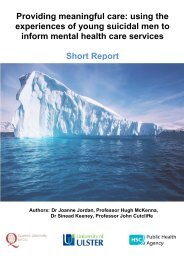Saving Mothers' Lives: - Public Health Agency for Northern Ireland
Saving Mothers' Lives: - Public Health Agency for Northern Ireland
Saving Mothers' Lives: - Public Health Agency for Northern Ireland
You also want an ePaper? Increase the reach of your titles
YUMPU automatically turns print PDFs into web optimized ePapers that Google loves.
78<br />
4 Haemorrhage<br />
William Liston<br />
Obstetric haemorrhage: Specifi c recommendations<br />
All staff require regular training on identifi cation and management of maternal collapse, including<br />
the identifi cation of hidden bleeding and the management of haemorrhage, which is also a key<br />
recommendation of this Report.<br />
An early warning scoring system of the type described in the Chapter on Critical Care, another key<br />
recommendation of this Report, may help in the more timely recognition of cases of hidden bleeding.<br />
When severe haemorrhage occurs it is good practice to call straight away <strong>for</strong> the aid of colleagues with<br />
greater gynaecological surgical experience.<br />
The management of women with placenta percreta requires careful multidisciplinary planning in the<br />
antenatal period and the involvement of a consultant-led multidisciplinary team at delivery.<br />
Guidelines <strong>for</strong> the management of women who refuse blood products must be made available to, and<br />
discussed with, all maternity staff as part of their routine training, postgraduate education, continuing<br />
professional development and practice.<br />
Women should be advised that caesarean section is not an entirely risk-free procedure and can hold<br />
problems <strong>for</strong> current and future pregnancies.<br />
All women who have had a previous caesarean section must have their placental site determined.<br />
This, too, is a key recommendation of this Report. If there is any doubt, magnetic resonance imaging<br />
(MRI) can be used along with ultrasound scanning in determining if the placenta is accreta or percreta.<br />
Summary of key fi ndings <strong>for</strong> 2003-2005<br />
The last Report drew attention to the impressive decline in deaths from obstetric haemorrhage in the<br />
United Kingdom over the last 50 years and outlined some of the possible reasons <strong>for</strong> this. In this triennium,<br />
2003-05, 14 women died from haemorrhage; a rate of 0.66 per 100,000 maternities, similar to the rate<br />
<strong>for</strong> the previous triennium. Three other cases of haemorrhage associated with uterine rupture or genital<br />
tract trauma are included here, which, in previous Reports were counted and discussed in a now defunct<br />
Chapter relating to other causes of Direct maternal deaths. This old Chapter is no longer required as the<br />
number of maternal deaths from these causes is now too small <strong>for</strong> them to require a specifi c Chapter of<br />
their own.<br />
Overall in the United Kingdom (UK), the risk of a pregnant women dying from haemorrhage is very small.<br />
However, there are several points which are not immediately apparent from these few UK deaths:<br />
• Ten of the 17 women, almost three-fi fths, of those who died received less than optimal care. In<br />
particular, there were questions concerning the most appropriate management of women with<br />
placenta percreta, a problem likely to become more prevalent due to its emerging relationship with<br />
previous caesarean section scars. There were also apparent failures in recognising the signs and<br />
symptoms of intra-abdominal bleeding especially after caesarean section. Lastly, ergometrine often<br />
seems to have been <strong>for</strong>gotten as a useful oxytocic drug.<br />
• At least two major surveys in developed countries 1, 2 , have shown around two thirds of all cases of<br />
severe maternal morbidity, so called “near misses”, are related to severe haemorrhage. Midwives,



